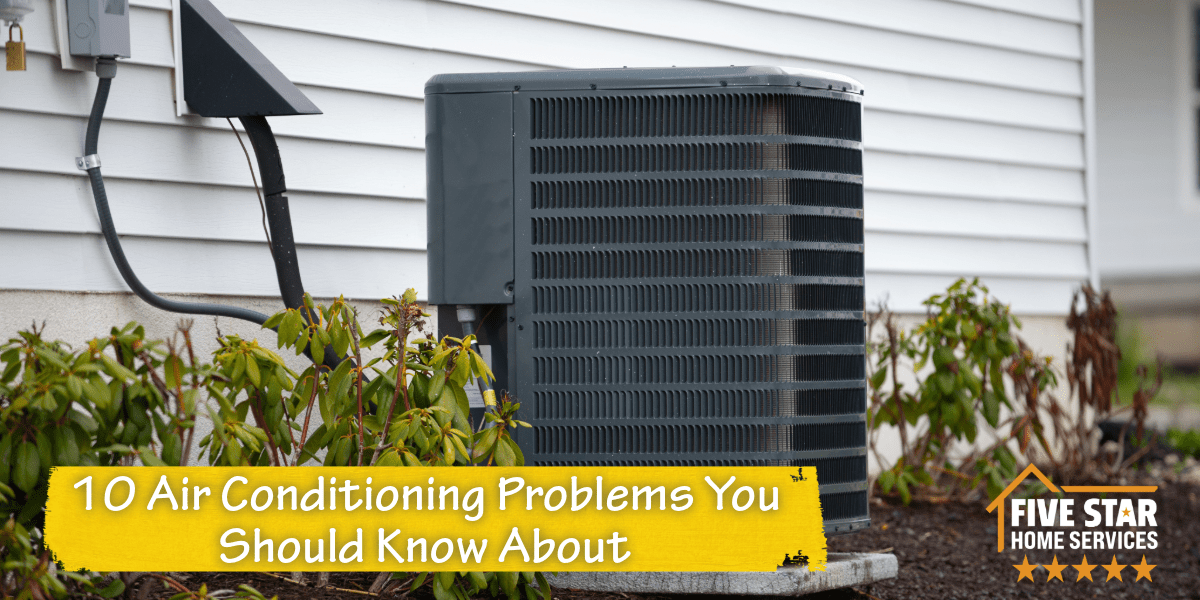The increased demands of a household may likely put a heavy strain on your AC system, especially so when the weather gets significantly warmer. As a homeowner, the efficient performance of your AC unit depends on recognizing the problems AC systems may exhibit during their regular operations. Identification of these problems helps you to know what steps you need to take or if an expert needs to be involved.
#1: Warm Air Is Blowing From AC Unit
Some of the causes of this common problem are: dirty filters, decreased refrigerant levels, or clogged evaporator coils. Airflow can get obstructed and cause the condenser unit to freeze up, leading to decreased energy efficiency and poor cooling.
What you can do:
- Check the filter and replace it at least every three months.
- If you notice a hissing/bubbling sound or a leak around the unit, a technician might need to recharge the refrigerant.
- Evaporator coils that are clogged due to ice or dirt will need to be defrosted or cleaned, too.
- Scheduling regular maintenance for your AC unit is always recommended.
#2: AC Does Not Turn On
Because AC systems rely on complex electrical mechanisms, one of the reasons the AC may not turn on is a power surge or a circuit breaker tripping. Thermostat issues and even faulty wiring may also prevent the AC from turning on.
What you can do:
If the fan does not blow when you turn on the AC, check that the circuit breaker has not tripped. Simply flip the switch back to the on position in your electrical panel. Check that the thermostat is set to the desired temperature or that the batteries are working. Have a licensed electrician check your AC system if there is faulty wiring.
#3: Thermostat or Sensor Issues
A temperature sensor may be located remotely or situated within the thermostat itself. The thermostat in your home provides you with control over how hot or cold you want your indoor environment to be. Its main role in air conditioning is to take appropriate action when a temperature changes occur. If you notice your air conditioner running continuously, blowing warm air, short cycling, or just doesn’t seem to reach the cooler temperature that you set it to, you may be dealing with a problem concerning your thermostat or sensor.
What you can do:
- Check if the batteries in your thermostat need to be replaced.
- Replace or upgrade to a better thermostat if it is old.
- Ensure that the sensor wire near the evaporator coils is in the correct position and not bent.
#4: Electric control failure
If you notice the AC frequently turning on and off, making unusual clicking sounds, or not turning on at all, there might be something wrong with the electrical circuit within the AC system.
What you can do:
- As a preventative measure, refrain from adjusting the temperature too often. The frequent readjustments and constant switching of the AC on and off contribute to increased wear and tear on the motor components of the AC system. These motors are dependent on a functioning electrical connection.
- If the problem is electrical, it is best to deal with it by calling a licensed electrician.
#5: Refrigerant Leak/Decreased Refrigerant Levels
The refrigerant in the AC system undergoes a refrigerating effect by absorbing heat. Your AC functions most efficiently when the refrigerant charge is exactly up to the manufacturer’s recommendation. In other words, it is not overcharged nor is it undercharged. Here are signs to look out for when suspecting a refrigerant leak:
- temperature is not cooling down or there is not enough cooling
- AC unit operates continuously or short cycles too often
- hissing or gurgling sound within the AC system; wetness on the floor due to condensation on evaporator coils resulting from inefficient heat absorption by refrigerant.
What you can do:
- If your desired cool temperature is not met, ensure it is not because of a clogged air filter. Avoid lowering the temperature even more as this results iincreasesal usage and thus, higher bills.
- Even if there is no visible leak, and the signs are suspicious for low refrigerant levels, call a licensed HVAC technician to check your AC system. He may need to charge your refrigerant or fix a leak in the system.
#6: A/C System Is Making Unusual Sounds
The AC system generates sounds that are within its normal operations. A sudden change in what you normally hear coming from your AC system may indicate a problem in the AC system’s circuitry or mechanical components. Here are indicators of specific problems depending on the sound:
- hissing leaking problems
- buzzing and clicking electrical and relay problems
- rattling loose hardware
- screeching compressor/fan problems
- whistling problems with airflow
What you can do:
Take note of the kind of noise your AC system is making, and call a licensed HVAC technician so that he can check and evaluate the issue.
#7: Frozen Evaporator Coil
Evaporator coils remove heat from room air. Obviously, for the flow of air to remain unrestricted, the evaporator coils must be kept clean and free from dirt or dust. After the evaporator coils move the heat from the air into the refrigerant, the air then gets cooled down and travels through the ducts to get distributed in the home. Here are some reasons the evaporator coils can get frozen:
- Evaporator coils are dirty. If dirt accumulates on the coils, it can prevent the heat from being absorbed and thus, causes them to get cold and actually freeze over.
- Restricted air flow. This may be due to closed registers, a broken air handler, or a dirty air filter, which all contribute to heat not being absorbed from the air, leading to condensation and freezing.
- Low levels of refrigerant. This would cause inefficient performance of the evaporator coils. Air movement across the coil keeps its temperature higher, but a low refrigerant level removes more heat than intended at the coil, thereby cooling them and eventually freezing the coil.
What you can do:
- Make sure that your HVAC system is on a regular maintenance schedule.
- Prevent restricted air flow by checking on registers if they are closed.
- Check on the air filters to ensure that they are clean.
#8: Drainage Problem
This usually refers to an issue with the condensate drain line which is a pipe that runs from the indoor AC unit to the exterior of your home. Condensation occurs during an AC’s normal operation, and the resulting condensate or liquid requires drainage. The condensate drain line prevents moisture from accumulating in the system by allowing the condensate to flow outdoors so that the AC functions properly. If a drainage problem is present, you would notice water pooling near the AC or the condenser unit. You may also notice a moldy smell close to the drain or in the air coming from the vents.
What you can do:
- Turn off the AC system and check if the drain pan is full, which may indicate a clog. Empty the pan using a wet/dry vacuum. Simple clogs may be loosened using drain cleaners.
- Call an HVAC professional to check other possible causes such as a damaged drain pan, clogs due to dirt or mildew, or an improper slope of the drain line itself.
#9: Dirty Air Filters
Filters in the AC systems function to protect them from dust and dirt. They must be inspected at least twice a year. The airflow and cooling capacity of your AC unit is effectively reduced if the air filter is dirty. The very efficiency of your AC system may also be affected.
What you can do:
Replace the air filter at least every three months. Make sure that the replacement is the same dimensional size, which is printed on the filter frame. Mesh-type filters have an oily
side that collects dust. This should face upward into the cold-air duct. Box-type filters usually have one side that is covered with wire mesh that should face the blower, with the arrow (indicated on the top of the frame) pointing toward the blower or direction of the air flow.
#10: Compressor Problems
The compressor is primarily responsible for creating a pressure difference in your AC system so that the refrigerant can flow through one part of the system to the other. You might have compressor problems if you notice:
- no hum or starting sound coming from the compressor
- compressor runs but has short cycles
- runs continuously
- noisy
What you can do:
If you don’t hear a humming sound, you could check if you have blown a fuse, which you must replace. Ensure the thermostat is reset to a proper level, as it may have been set too high. The compressor may also experience inadequate cooling, so check refrigerant levels. A noisy compressor may be due to the unit not bolted down correctly, or parts such as piston pins, etc. may already be wearing out. Examine bolts and/or have the compressor repaired or replaced.
Your AC unit can perform its best when it is well-maintained. Knowing an AC unit’s common problems will help you be prepared to deal with them when they arise. There are ways of taking care of certain issues on your own, and whether your AC problems are hard to manage or you prefer the professional approach, you can always turn to Five Star Home Services for all your AC needs. Our certified HVAC technicians are available to ensure your AC unit works as efficiently as it should. Give Five Star Home Services a call at (833) 405-8009.

